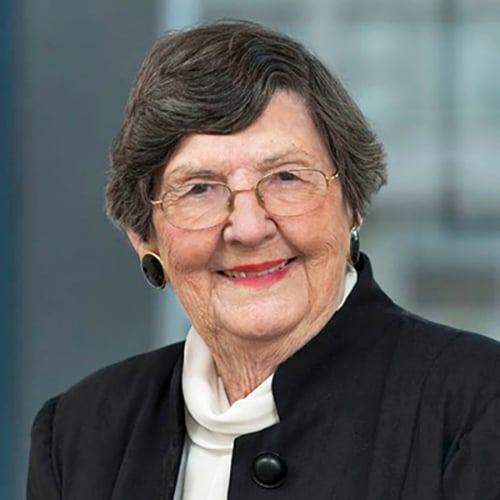
This week we continue our series on Simon & Garfunkel and great New York cancer scientists/researchers. We devote this week’s article to Jimmie Holland, whose name sounds a lot like the name of last week’s hero, James Holland, who was actually her husband, but she is truly a monumental figure in her own right, though I bet the mail delivery at their home was frequently screwed up. And we discuss Jimmie as we ponder the “Sounds of Silence”—“Silence like a cancer grows, hear my words that I might teach you, take my arms that I might reach you.”
Jimmie Coker was born in 1928 in a small town in Texas (population less than 100). She got her undergraduate degree and went to medical school at Baylor College of Medicine. She decided to specialize in psychiatry after her first husband committed suicide at age 27. She went on to a faculty position at the State University of Buffalo in New York and, while there, she met James Holland who was the chief of oncology there at the time, and they ultimately married in 1956. She became interested in his cancer work and, in particular, the issues of the quality of life of his cancer patients. Together they published some papers on the quality of life of cancer patients in trials. But the discussions with him sparked her interest in the psychosocial issues of patients with cancer.
They went to New York City when he was recruited to Mount Sinai Hospital, and she went to a position at Montefiore Hospital in the Bronx. In 1977, she was recruited to Memorial Sloan-Kettering Cancer Center, where she founded its Department of Psychiatry and where she remained as chair for the next 20 years.
She is credited with founding the field of psychiatric oncology, also known as psycho-oncology or psychosocial oncology. This is an interdisciplinary field that merges together the behavioral aspects of the cancer experience with its medical and treatment aspects, and also includes how the individual’s social milieu and sociological environment impact on the totality. The field covers the cancer experience from diagnosis through treatment, survivorship and beyond, and includes end-of-life care as well. Since its initiation by Jimmie Holland, it has become recognized as an integral part of patient care. Every cancer center now provides such psycho-oncology services to its patients as a routine part of its overall services.
Going back to Jimmie Holland, she founded the first society for this field, the American Psychosocial Oncology Society, and she also edited the first textbook on the subject.
While at Memorial, she conducted some of the first epidemiologic studies of the psychological impact of cancer on patients and their families.
In the early years of her work, there was great skepticism of the value of such efforts. Psychological care and research were considered “soft science,” but the passage of time has lent it greater credibility and proved its worth to a greater and greater degree. Oncology care now recognizes the vision of Jimmie Holland in terms of the incorporation of psychosocial care into the overall cancer care picture.
It would not be an exaggeration to say that the later development of palliative care and hospice care and their evolution into major elements in cancer management are direct outgrowths, or at least heavily influenced by, the psychosocial oncology enterprise and the visionary thinking that Jimmie Holland pioneered in the 1970s.
Jimmie and James Holland had five children together. She died suddenly in December of 2017.
Jimmie would have agreed that:
“The words of the prophets
Are written on the subway walls
And tenement halls
And whispered in the sounds of silence.”
Alfred I. Neugut, MD, PhD, is a medical oncologist and cancer epidemiologist at Columbia University Irving Medical Center/New York Presbyterian and Mailman School of Public Health in New York. Email: ain1@columbia.edu.
This article is for educational purposes only and is not intended to be a substitute for professional medical advice, diagnosis, or treatment, and does not constitute medical or other professional advice. Always seek the advice of your qualified health provider with any questions you may have regarding a medical condition or treatment.








